Redditor Sabotages His Neighbor's Efforts To Find His Runaway Dog
Living in a pleasant neighborhood is something that everyone desires. But it's often the hardest thing to find when choosing where to live.
People are so different, and you never know what to expect from them. Yet, we still hope everyone possesses basic social norms until proven otherwise.
Recently, a Redditor asked the community for advice and shared their story online. Redditor goes for a run in their neighborhood multiple times a week and almost always run the same route.
Last time while running down a side street, they noticed a man chasing a dog. The man asked the OP if they could help him by grabbing the dog for him, but the OP pretended they didn't hear him.
OP bypassed them and kept running. While this OP's act doesn't seem friendly, they also explained why they didn't want to be involved in chasing someone's dog.
OP said they don't like dogs because they had unpleasant experiences with dogs in their neighborhood and learned the hard way that it's best to stay away from them as much as possible. Later, on the way home, OP saw the owner still looking for his dog.
The owner even approached them and asked why they didn't want to help him. OP explained to him their point of view and continued their run.
But about a quarter mile away, they saw the lost dog approaching a lady who was walking her dogs. They even heard her talking to the lost dog, wondering where its owner was, but decided to stay quiet and went home because it was none of their business.
Now, OP is in a dilemma whether their actions were wrong in this whole situation.
Here's the question:

Here's how it started:

"I act like I don't hear him and keep running."

The Psychology of Conflict and Sabotage
This situation reflects underlying issues in neighborly relationships that can escalate into hostility. Social psychology suggests that when individuals feel threatened or disrespected, they may resort to sabotage as a defense mechanism. Research published in the Journal of Social Issues indicates that perceived injustices can lead individuals to act out in ways that undermine others, often as a misguided attempt to regain control.
In this case, the Redditor may have felt justified in their actions due to perceived slights from the neighbor, illustrating how emotions can drive decisions.
"I'm not much of a fan of the dogs (or owners) in my neighborhood"
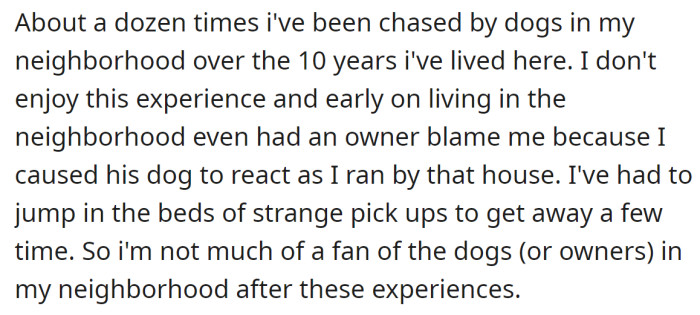
Later, the OP even explained to the owner why they wouldn't want to help him:
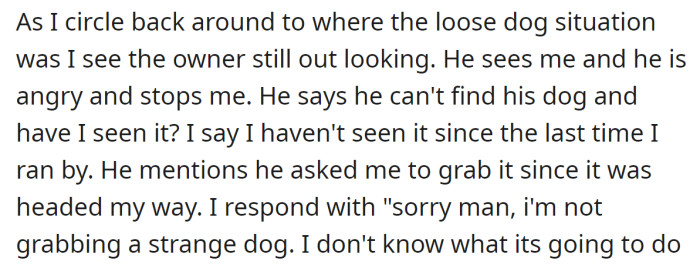
But OP's act here... Just made them think again about this whole situation:

Additionally, the concept of projection may play a role in this behavior. When individuals experience dissatisfaction in their own lives, they may project those feelings onto others, leading to destructive actions. A clinical psychologist explains that understanding this dynamic can help individuals recognize their triggers and make more constructive choices in the future.
Engaging in self-reflection and exploring the roots of these feelings can foster healthier interactions with neighbors and others.
"YTA for not telling the woman where the owner was."
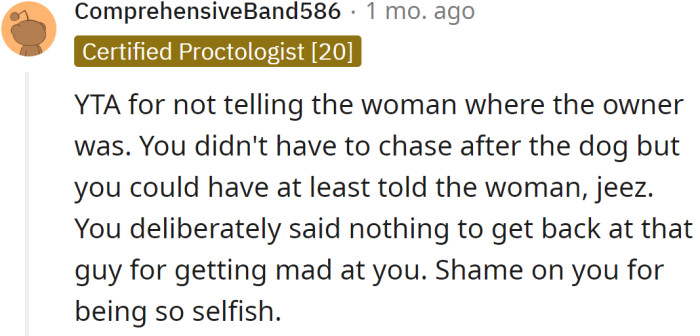
"A little help would've been nice"

"You could've at least told the lady walking her dogs who/where the owner was and had her help."
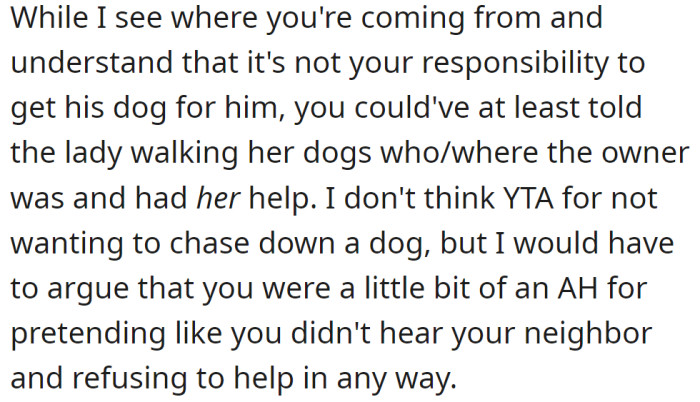
Strategies for Healthy Conflict Resolution
To address conflicts with neighbors, open communication is key. Experts recommend using non-confrontational language to express feelings and concerns, which can help de-escalate potential tensions. For example, saying 'I felt hurt when I perceived your actions as unkind' can foster understanding rather than defensiveness.
It's important to approach conflicts with a willingness to listen and understand the other person's perspective, creating a foundation for resolution.
"It's not understandable to refuse to aid someone in distress in a safe way."
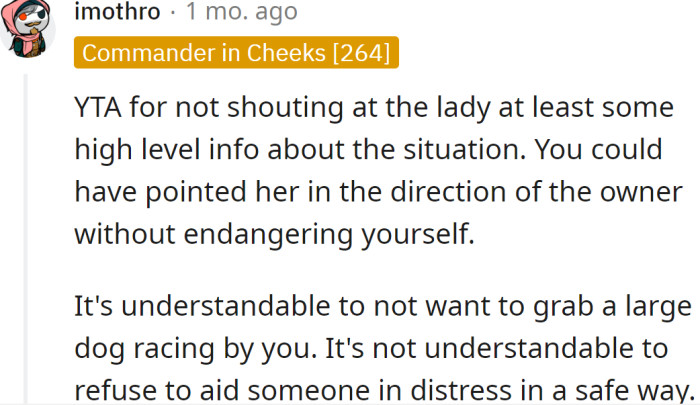
Apparently, too hard.

"That's just next level asshole."
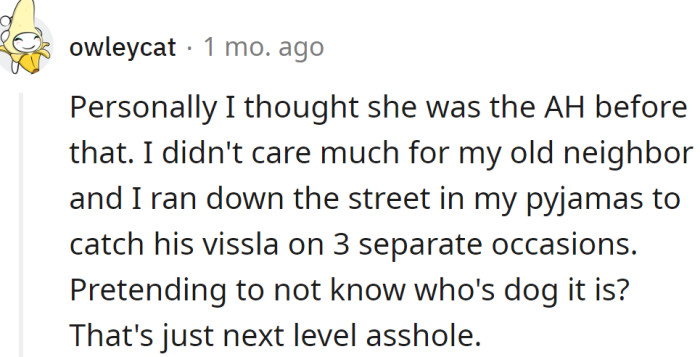
Moreover, developing emotional intelligence can significantly improve interpersonal relations. Research suggests that individuals who practice self-awareness and empathy can better navigate conflicts without resorting to sabotage or other destructive behaviors. A study from the University of Michigan found that individuals with high emotional intelligence tend to have more positive relationships and experience less conflict overall.
By focusing on emotional growth, individuals can cultivate healthier interactions and prevent future disputes.
"There's definitely no excuse for that."
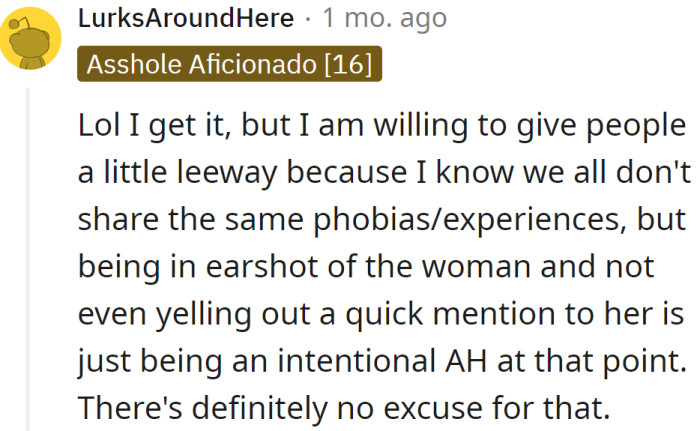
"The other stuff is understandable but that last part was just you being an asshole."
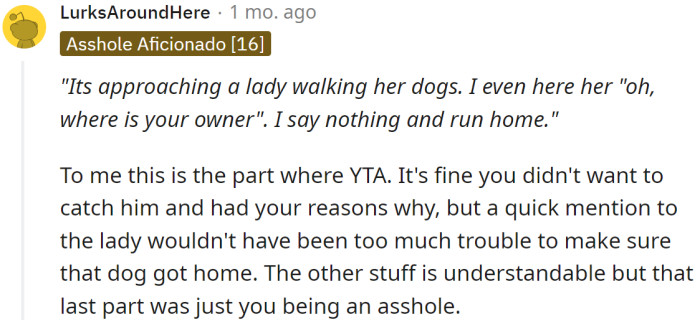
"It doesn’t seem like you’re scared of dogs, but that you’ve built up resentment towards them"
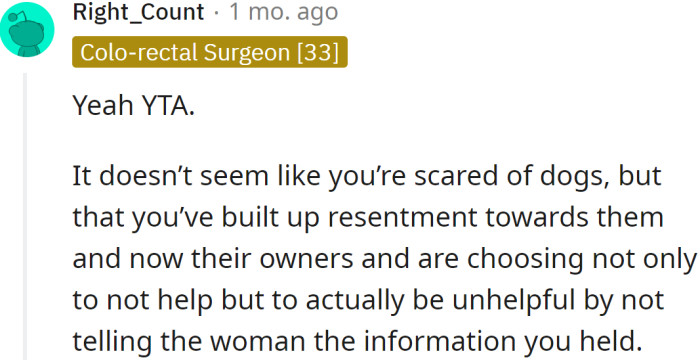
Obviously, we are all different, but some politeness wouldn't kill anyone. The OP should have, at least, told the lady that the owner was still looking for his dog and showed her where he was.
Although OP had their reason for not wanting to grab the unknown dog, ignoring the whole situation was still very rude, according to other Redittors.
Psychological Analysis
This behavior illustrates a common response to perceived threats in social relationships, where individuals may feel compelled to undermine others as a form of self-defense. Recognizing the emotional underpinnings of such actions can help individuals navigate conflicts more constructively, turning potential hostilities into opportunities for dialogue and growth.
Analysis generated by AI
Analysis & Alternative Approaches
This scenario highlights the complexities of neighborly relationships and the psychological patterns that can lead to conflict. Recognizing the dynamics of projection and defensiveness can provide insight into personal behaviors and motivations.
Ultimately, fostering open communication and emotional intelligence can lead to more positive interactions and resolutions in our communities.




